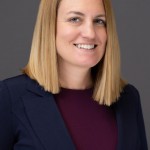February 2, 2021
Lead Like an Ally
Julie Kratz’s passion and calling in life is to help others with the often difficult conversation of diversity, equality, and inclusion, leading as an ally for others. Working in corporate America for 12 years while also earning an MBA, Kratz had the opportunity to help women leaders with their game plans. She spent time with her consulting clients helping women build their careers. It was this opportunity that led her to the career she has today of being an executive coach to help others.
When to Make a Change
Challenges will always be presented throughout your career, but there’s never a right time to make a change of career or start a new project, said Kratz. She shared these same thoughts when making the leap from corporate America to be a coach, “Knowing I had enough traction and I tried doing some of the coaching and leadership development with women, I knew it was my calling. It was what I was most passionate about in my career,” she said.
Listening to your calling is essential if you want the most fulfillment out of your job. Kratz said you should ask yourself about what you lose yourself in? What do you enjoy doing on your best days? Too often people are stuck in their ways with their job, their responsibilities holding them back from taking a leap and doing something they think is their calling. “There’s something inside you that is unique to you, that not everybody is thinking about and it’s probably always been there since you were little,” Kratz said. She advised spending time to reflect on what you want.
What is a Game Plan?
Kratz spends time helping women put together their game plans. Typically, it is women in their mid-career point putting together a plan. Due to the pandemic and changes in primary care, now more than ever before is an important time for women in the workplace to take a look and put theirs together while asking themselves, how can they be more inclusive?
To answer this huge question, Kratz suggests creating a one-page document. In this document answer, what is your purpose? This is who you are and what you stand for. Then set yourself a maximum of three goals. What are you going to do? List your skills, behaviors, and attributes to fine-tune your goals, and make sure that they are obtainable and realistic so you can achieve them.
The host of the webinar, Dr. Chia-Li Chien also suggested having three 90-day action plans to hold yourself accountable with your goal. If you are struggling to reach the goal at the end of the 90 days then reach out and find a mentor or coach to help. “One thing that is important is the discipline of self-accountability and energy to drive towards success,” she said.
As a Leader, How Can You Facilitate Positive Change?
It’s important to have diverse perspectives on your team, Kratz said, “Women make a lot of decisions but are underrepresented from a financial planner perspective.” The next generation entering the workforce and the next generation of consumers are the most diverse so far with their race, gender, and fluidity, she said. Therefore, it is important to value diversity and also reflectivity within the team. “Make sure everyone on your team is feeling heard and seen and that they belong,” she said. As a leader, it is your job and responsibility to empower people. The best way to achieve this is by listening, empathizing, and understanding them. They need to know that their leader is there for them but also cares about them. She furthered explained that you don’t want others spending mental energy to not be themselves in the workplace. Ultimately, that is a waste of mental energy that could be used in other, more productive ways. Importantly, everyone on the team needs to be involved in the conversation, including those with power and privilege to make a difference.
Making a Change with Confidence
When you think your voice won’t make a change in the workplace it can leave you feeling deflated with little to no reason to speak up. However, without your voice, there will be no change. So, ask yourself, are you ok with things not changing and being the same? It starts with having the confidence to advocate for yourself and as COO of Facebook, Sheryl Sandberg said, lean into the conversation. “If you think your workplace is conducive to change, if there are certain leadership members that have demonstrated that they might want to be an ally, get their attention,” said Kratz. Talk to them about advocating with you and for you. As a leader, ask yourself, how can you show others you are a safe place to talk?
Clients and Consumers Are Getting Younger
As those in the workplace get older, it means the clients and consumers are getting younger. With growing gaps between the different generations, how can you listen to those that are younger? The current Gen Z mindset is very different from those that are the oldest in the workplace as they grew up with inclusive relationships and perspectives. Therefore, it’s important to show vulnerability, empathy, curiosity, listening, coaching, and mentoring when working with them.
To learn more about yourself and the mindsets of your generation, question your assumptions and process of thinking. How do you know it is true? Check and challenge one another’s biases to help rethink them for the future. The older someone gets, the harder it is and the more mental energy required to rethink processes.
A great way to learn about unconscious biases that we all have is by using the Harvard online test, Kratz suggested. It allows you to pick different categories and learn about biases you may not even be aware of. Our bias can play into our behavior, she said, “It’s not my fault I have a bias, however, it is my responsibility to be aware of it and make sure my actions don’t result in the ways that make people feel othered.” The earlier this conversation can be started with children and adults, the better it’s going to be, she said.
Inclusion Culture
Kratz explained that inclusion starts at the top of the business organization. When the top members are passionate as well as consistent with an intentional approach, it can create a great inclusive culture within the workplace. So, how do you intentionally talk about diversity and inclusion? Kratz suggests training and having open communication within the organization to voice concerns etc. Training can be as simple as self-paced learning in short ten-minute bursts or a monthly inclusion lunch.
A Piece of Advice to Financial Planners
Kratz closed the webinar with a piece of advice specifically to financial planners. Ask yourself these questions, she said.
- What customers do you want to serve?
- What customers do you want to attract?
- What ethnicity, gender, and sexual orientations do you want to attract?
Lastly, ask yourself, why is it important to be inclusive?
 About Julie Kratz:
About Julie Kratz:
Julie Kratz is a highly-acclaimed speaker and trainer who led teams and produced results in corporate America. After experiencing her own career “pivot point,” she developed a process for women leaders to build winning plans. Promoting gender equality in the workplace, Julie is a TEDx speaker, a frequent keynote speaker, and an executive coach. She holds an MBA from the Kelley School of Business at Indiana University, is a Certified Master Coach, and is a certified unconscious bias trainer. Her books include Pivot Point: How to Build a Winning Career Game Plan, ONE: How Male Allies Support Women for Gender Equality and Lead Like an Ally: A Journey Through Corporate America with Strategies to Facilitate Inclusion. Meet Julie at NextPivotPoint.com
 About the Host:
About the Host:
Dr. Chia-Li Chien is a succession program director at Value Growth Institute, a succession consulting practice dedicated to helping business owners increase their firms’ equity value. Before her private consulting practice, she held several senior management positions in Fortune 500 companies. Dr. Chien is a director of the financial planning program at the School of Management at California Lutheran University. Dr. Chien is a frequent speaker about succession and retirement planning at national conferences and has published three award-winning books, including her most recent publication, “Enhancing Retirement Success Rates in the United States.” Dr. Chien serves on the boards of various national financial service associations. She holds a doctorate in financial planning and is a Certified Financial Planner (CFP®) as well as Project Management Professional (PMP®).
 About the Author:
About the Author:
Rosie Baker is an undergraduate student at California Lutheran University, graduating in May 2021. She is studying Communication with an emphasis in PR and Advertising and has a minor in Creative Writing. In July 2020, she published her first book, Mirrors & Windows: Unlocking a New Framework to Envision Your Success, with New Degree Press.
Dr. Chien interviewed Julie Kratz on “Lead Like an Ally” on February 2, 2021, at 1:00 pm PST.
Human Capital is not in any business’ balance sheet. Yet, Human Capital is the most important and valuable assets of any company. Financial Planning professionals are leaders in their firm as well as leaders to their clients. In this session, we will discuss the following questions:
- How can financial planning professionals facilitate positive changes through leadership strategies?
- How can financial planning business owners attract and retain diverse talents and clients?
- How to become inclusive leaders?
- What can financial planning professionals do to have an inclusive culture?
About Julie Kratz
 Julie Kratz is a highly-acclaimed speaker and trainer who led teams and produced results in corporate America. After experiencing her own career “pivot point,” she developed a process for women leaders to build winning plans. Promoting gender equality in the workplace, Julie is a TEDx speaker, a frequent keynote speaker, and an executive coach. She holds an MBA from the Kelley School of Business at Indiana University, is a Certified Master Coach, and is a certified unconscious bias trainer. Her books include Pivot Point: How to Build a Winning Career Game Plan, ONE: How Male Allies Support Women for Gender Equality and Lead Like an Ally: A Journey Through Corporate America with Strategies to Facilitate Inclusion. Meet Julie at NextPivotPoint.com
Julie Kratz is a highly-acclaimed speaker and trainer who led teams and produced results in corporate America. After experiencing her own career “pivot point,” she developed a process for women leaders to build winning plans. Promoting gender equality in the workplace, Julie is a TEDx speaker, a frequent keynote speaker, and an executive coach. She holds an MBA from the Kelley School of Business at Indiana University, is a Certified Master Coach, and is a certified unconscious bias trainer. Her books include Pivot Point: How to Build a Winning Career Game Plan, ONE: How Male Allies Support Women for Gender Equality and Lead Like an Ally: A Journey Through Corporate America with Strategies to Facilitate Inclusion. Meet Julie at NextPivotPoint.com
